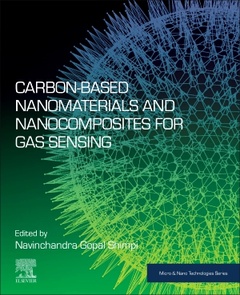Carbon-Based Nanomaterials and Nanocomposites for Gas Sensing Micro and Nano Technologies Series

Carbon-Based Nanomaterials and Nanocomposites for Gas Sensing discusses the state of the art, emerging challenges, properties, and opportunities of various carbon-based nanomaterials and nanocomposites, for their application in smart gas sensors. The book focuses on various carbon-based nanomaterials and their nanocomposites, sensing mechanism, device fabrication, and their application for the sensing of various hazardous gases. This is important for several industries, environmental monitoring, and human healthcare, due to increased industrialization.
Carbon-Based Nanomaterials and Nanocomposites for Gas Sensing provides systematic and effective guidelines for researchers who want to gain a fundamental understanding of how this class of materials is being used for gas sensing. Since these sensors can be applied for the automation of numerous industrial processes, as well as for everyday monitoring of various activities, such as public safety, engine performance, medical therapeutics, and in many other situations, this book will catch the attention of readers and motivate them for advanced research in the development of smart and efficient gas sensors.
1. Carbon-based smart nanomaterials 2. Carbon nanomaterials-based gas sensors 3. Carbon-based gas sensing materials 4. Carbon nanotube-based gas sensors 5. Carbon nanofiber-based gas sensors 6. Graphene-based gas sensors 7. 3D Hierarchical carbon-based gas sensors 8. Conducting polymer-based gas sensors 9. Future prospects
Dr. Shilpa Jain has been working as an Assistant Professor in the Department of Chemistry, Jai Hind College, University of Mumbai, Mumbai, since November 2016. She has done her Ph.D. under the guidance of Dr. Navinchandra Shimpi from University Department of Chemistry – University of Mumbai, Mumbai. Her Ph.D. topic was “Technique development in synthesis of smart nanomaterials and their application in sensing. Her research area is Nanomaterials, Nanotechnology, Gas Sensors & Polymer Nanocomposites. She has worked on hybrid nanomaterials and na
- Offers a one-stop resource, bringing together information currently scattered over journal papers and project reports
- Presents a focused concept reflecting the properties, synthesis, and sensing capabilities of carbon-based nanomaterials and their composites
- Combines fundamental experimental and theoretical information with industrial needs and engineering design methods
Date de parution : 10-2022
Ouvrage de 260 p.
19x23.4 cm
Mots-clés :
?Applications; Architecture; CNT; Carbon nanocomposites; Carbon nanofibers; Carbon nanomaterials; Carbon nanotubes; Conducting polymer; Conducting polymers; Electrospinning; Fabrication techniques; Fullerene; Functionalized CNFs; Gas sensing; Gas sensor; Gas sensors; Graphene; Graphene synthesis; Heterojunction; Hybrids; Hydrothermal method; Nano-materials; Nanocomposite; Nanocomposites; Nanocomposites and gas sensor; Nanofibers; Nanomaterials; Polyaniline; Polypyrrole; Polythiophene; Reduced graphene oxide; Semiconducting metal oxides; Sensing materials; Surface functionalization; Technology; Three dimensional



